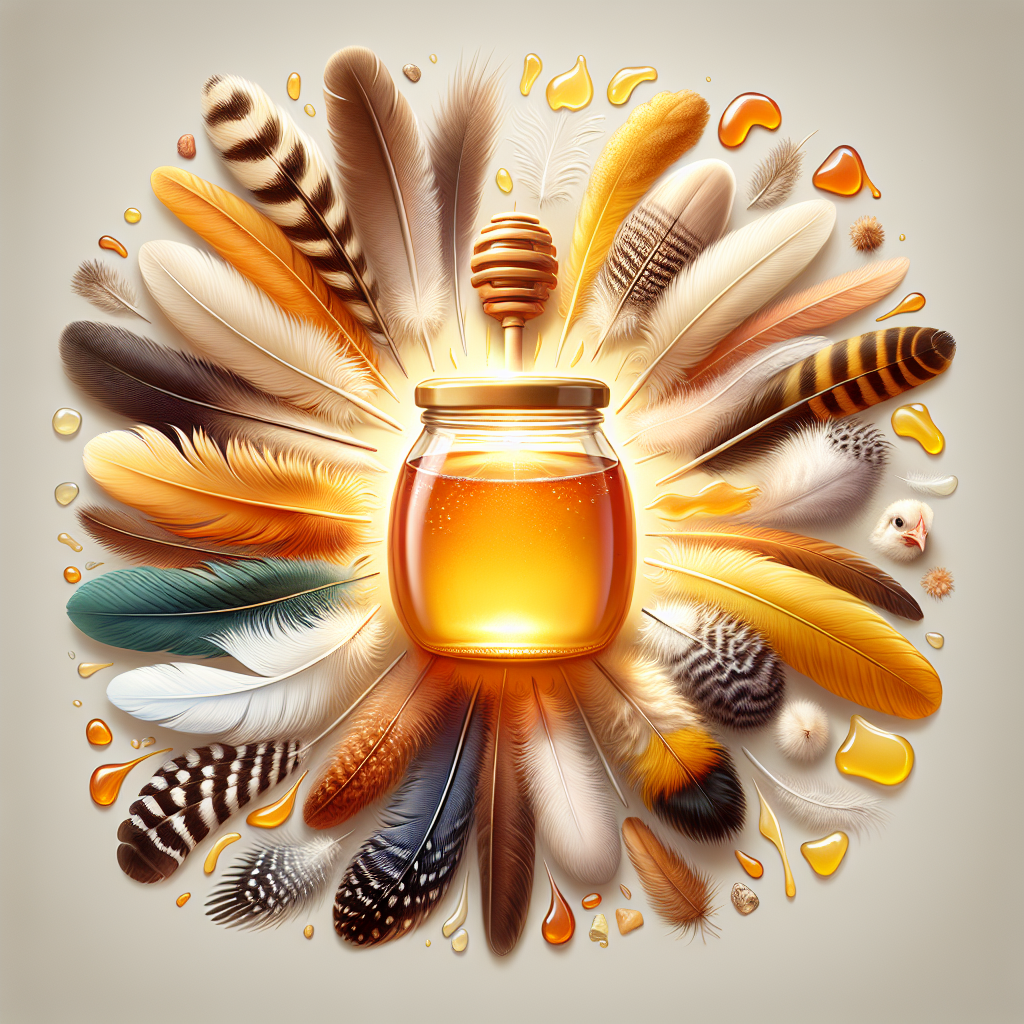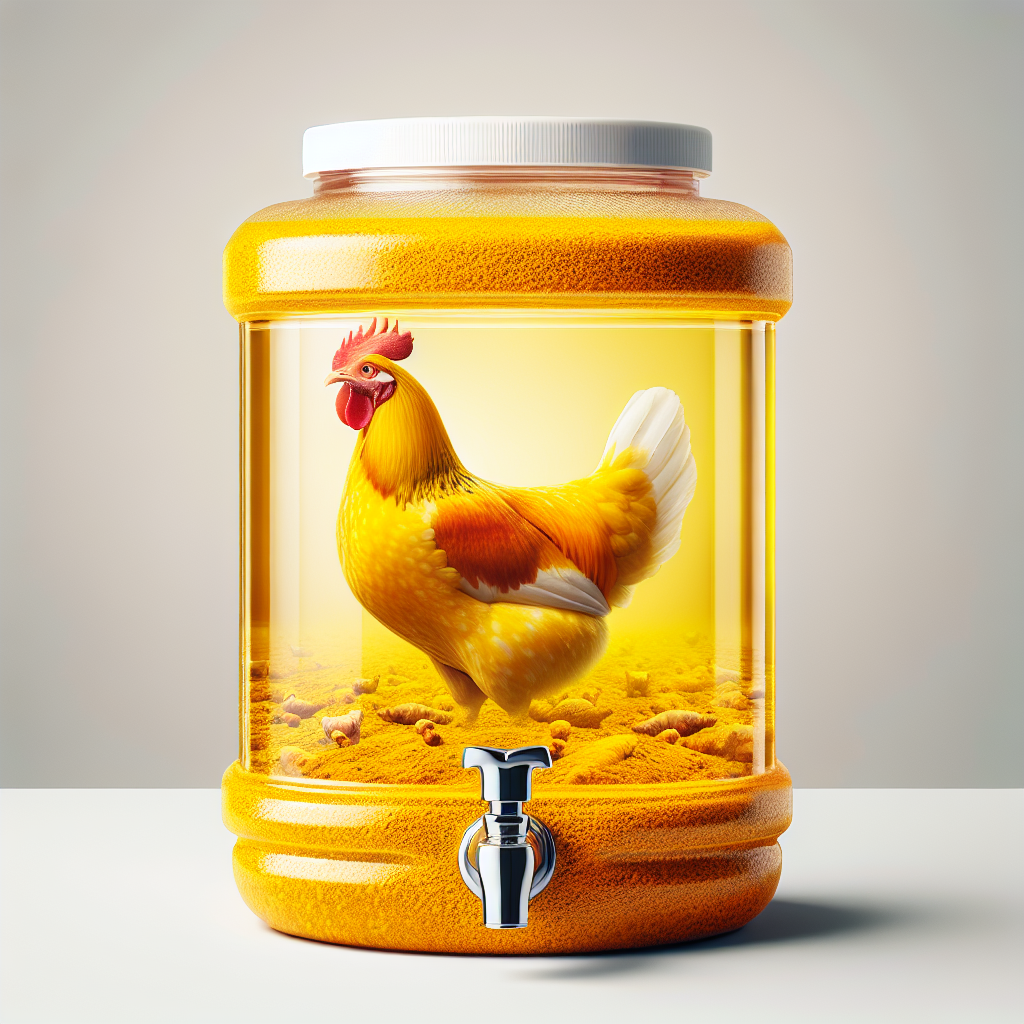If you’ve ever wondered about the magical properties of honey, then you’re in for a treat. In this article, we’ll explore how honey can be incredibly beneficial for wound care and overall health in chickens. From its natural antibacterial properties to its ability to boost the immune system, honey is a sweet and golden solution that can work wonders for our feathered friends. So, whether you have a few backyard chickens or a whole flock, read on to discover the power of honey in maintaining the well-being of your feathery companions.
Benefits of Honey for Wound Care in Chickens
Antibacterial Properties
Honey has been used for centuries as a natural antibacterial agent. It contains hydrogen peroxide, which helps to prevent the growth of bacteria in wounds. This can be highly beneficial for chickens, as their wounds are often prone to infection due to the unhygienic conditions they are exposed to. By applying honey to their wounds, you can help to create a barrier against bacterial growth and promote healing.
Anti-inflammatory Effects
In addition to its antibacterial properties, honey also has anti-inflammatory effects. When chickens suffer from injuries or wounds, inflammation is a common result. By applying honey to the affected area, you can help to reduce inflammation and alleviate pain. This can greatly improve the chicken’s comfort and aid in the healing process.
Moisture Retention
One of the advantages of using honey for wound care in chickens is its ability to retain moisture. Wounds that are dry and lacking moisture can delay the healing process. Honey acts as a natural moisturizer, creating an optimal environment for wound healing. It helps to keep the wound hydrated and prevents the surrounding tissues from drying out. This moisture retention can support the growth of new tissues and accelerate the healing process.
Promotes Wound Healing
Perhaps the most significant benefit of using honey for wound care in chickens is its ability to promote wound healing. Honey contains natural enzymes that can stimulate tissue regeneration and hasten the formation of new blood vessels. This can lead to faster wound closure and improved overall healing outcomes. When applied to chicken wounds, honey can help to speed up the recovery time and reduce the risk of complications.
Reduces Scarring
When chickens suffer from wounds, scarring is a common concern. However, the use of honey in wound care can help to minimize the appearance of scars. Honey’s ability to promote tissue regeneration and collagen production can contribute to the formation of healthy new skin cells. This can result in less visible scarring, improving the chicken’s overall appearance and well-being.
Using Honey for Wound Treatment in Chickens
Cleaning the Wound
Before applying honey to a chicken’s wound, it is crucial to clean the area thoroughly. Gently flush the wound with a sterile saline solution to remove any debris or bacteria. This will ensure that the honey can work effectively and reduce the risk of infection.
Applying Honey
Once the wound is clean, apply a thin layer of honey directly to the affected area. Use a clean, sterile applicator or your gloved hand to ensure hygienic application. Honey can be gently massaged into the wound to ensure proper coverage.
Covering the Wound
After applying honey, it is essential to cover the wound to protect it from further contamination. Use a sterile dressing or bandage to cover the wound and secure it in place. This will also help to prevent the honey from being licked off by other chickens or animals.
Dosage and Frequency
The dosage and frequency of honey application will depend on the severity of the wound. It is generally recommended to apply honey once or twice a day until the wound is fully healed. Consult with a veterinarian for specific dosage instructions based on the chicken’s condition.
Monitoring Progress
Regularly monitor the progress of the wound to ensure proper healing. Look for signs of infection, such as increased redness, swelling, or discharge. If any concerning symptoms arise, contact a veterinarian for further guidance and treatment.
Considerations for Using Honey in Chicken Wound Care
Honey Types and Quality
Not all honey is created equal, and it is essential to choose the right type and quality of honey for chicken wound care. Raw, unprocessed honey is preferred, as it retains the highest concentration of beneficial enzymes and antioxidants. Avoid honey products that have been heavily processed or mixed with additives.
Allergic Reactions
While rare, some chickens may be allergic to honey. Before using honey for wound care, perform a patch test on a small area of the chicken’s skin to check for any adverse reactions. If any signs of allergy, such as itching or swelling, occur, discontinue the use of honey and seek alternative treatments.
Avoiding Contamination
To ensure the effectiveness of honey in wound care, it is crucial to avoid contamination. Use clean and sterile tools when applying honey, and be cautious not to introduce any foreign substances into the wound. Proper hygiene practices are essential to prevent infection or further complications.
Consulting a Veterinarian
Before using honey for wound care in chickens, it is advisable to consult with a veterinarian. They can assess the severity of the wound and provide specific guidance on the appropriate use of honey. A veterinarian can also offer additional recommendations or alternative treatments if necessary.
Alternative Treatments
While honey can be highly beneficial for chicken wound care, it is not the only option. Depending on the nature and severity of the wound, there may be alternative treatments or medications that a veterinarian can recommend. It is important to explore all available options and choose the best course of treatment for your chicken’s specific needs.
Promoting General Health in Chickens with Honey
Boosting Immune System
Honey is known for its immune-boosting properties. It contains antioxidants and antimicrobial compounds that can help strengthen the chicken’s immune system, making them more resistant to various diseases and infections. By incorporating honey into their diet, you can promote overall health and well-being.
Digestive Health
Honey can have beneficial effects on a chicken’s digestive system. It contains prebiotics that nourish the beneficial gut bacteria, promoting a healthy gut environment. This can improve digestion and nutrient absorption, leading to better overall health and vitality in chickens.
Respiratory Health
Chickens often face respiratory issues, such as respiratory infections or congestion. Honey’s antimicrobial properties can help alleviate respiratory symptoms and provide relief. Adding honey to the chicken’s diet or misting it in their environment can support respiratory health and improve breathing.
Feather Condition
The condition of a chicken’s feathers is a reflection of their overall health. Honey can contribute to healthy feather growth and improved feather quality. Its moisturizing properties can prevent dryness and breakage, resulting in softer, shinier feathers.
Energy and Electrolyte Balance
Honey is a natural source of carbohydrates, providing chickens with a quick and easily digestible energy source. It can also help maintain electrolyte balance, especially during periods of stress or illness. Adding honey to their diet can ensure they have the necessary energy and nutrients to stay healthy and active.
Administering Honey for General Health Benefits
Incorporating Honey into Feed
One way to administer honey for general health benefits is to incorporate it into the chicken’s feed. Add a small amount of honey to their regular feed and mix well. Gradually increase the amount over time, ensuring that it is well-distributed throughout the feed to ensure all chickens receive their share.
Misting or Spraying Honey
Another method is to mist or spray honey in the chicken’s environment. Dilute honey with water in a spray bottle and lightly mist their living area. This will allow the chickens to inhale the beneficial properties of honey, supporting their respiratory health. Ensure that the mist is fine and not excessive to avoid creating a damp environment.
Adding Honey to Water
Honey can also be added to the chicken’s drinking water. Mix a small amount of honey with water and provide it in a separate water container. Make sure to clean and replenish the honey-water mixture regularly to prevent bacterial growth.
Using Honey as a Supplement
For specific health concerns or targeted benefits, you can administer honey as a supplement. This can be done by directly feeding a small amount of honey to the chickens or mixing it with other supplements or medications. Consult with a veterinarian for appropriate dosage and administration instructions.
Monitoring Chicken’s Response
When administering honey for general health benefits, closely monitor the chicken’s response. Observe their behavior, appetite, and overall well-being. If any negative effects or adverse reactions occur, discontinue the use of honey and consult with a veterinarian.
Cautions and Considerations for Using Honey as a Health Supplement
Sugar Content and Obesity
While honey can offer numerous health benefits, it is important to be mindful of its sugar content. Excessive consumption of honey can contribute to weight gain and obesity in chickens. Monitor their overall calorie intake and ensure a balanced diet to prevent obesity-related health issues.
Age and Health Status
The age and health of your chickens should be considered when using honey as a health supplement. Young or sick chickens may have different nutritional requirements or health conditions that need to be taken into account. Consult with a veterinarian for proper guidance on honey supplementation based on the chicken’s age and health status.
Balancing Nutritional Intake
Honey should be used as part of a balanced and varied diet. It should not be considered a sole source of nutrition. Ensure that the chickens receive a well-rounded diet that includes other essential nutrients to support their overall health and longevity.
Potential Allergic Reactions
As with any new food or supplement, there is always a risk of allergic reactions. Monitor the chickens closely after introducing honey as a health supplement and look for signs of itching, swelling, or any other allergic symptoms. If any adverse reactions occur, discontinue the use of honey and seek alternative options.
Monitoring for Adverse Effects
While honey offers many health benefits, it is important to monitor chickens for any adverse effects. Some individuals may have sensitivities or reactions to honey, even if they are not allergic. If any negative effects or unusual symptoms occur, consult with a veterinarian for further evaluation and guidance.
Honey as a Natural Remedial Tool in Poultry Health
Historical Significance
The use of honey in natural remedies dates back centuries and has been documented in various ancient medical texts. Its healing properties have been recognized and utilized by different cultures throughout history. The long-standing historical significance of honey as a medicinal tool speaks to its efficacy and reliability.
Scientific Studies and Evidence
In recent years, scientific studies have been conducted to explore the therapeutic properties of honey. These studies have confirmed many of the traditional uses of honey and provided scientific evidence to support its effectiveness. The research conducted on honey’s wound healing, antibacterial, and anti-inflammatory properties has been particularly promising.
Comparative Analysis with Antibiotics
Honey’s effectiveness in wound healing and infection control has been compared to conventional antibiotics in several studies. In some cases, honey has been found to be just as effective, if not more so, than certain antibiotics. This is significant as the overuse of antibiotics can lead to antibiotic resistance, making honey a potential alternative or complementary treatment option.
Sustainable and Environment-Friendly Option
Using honey as a natural remedy in poultry health is not only beneficial for the chickens but also for the environment. Honey is a renewable resource, and its production does not harm the environment. By utilizing honey instead of synthetic or chemical treatments, we can promote sustainability and reduce the ecological impact of poultry health practices.
Future Research and Development
While there is already substantial evidence supporting the use of honey in poultry health, further research is still needed to explore its full potential. Continued studies and advancements in honey research can lead to the development of more targeted treatments and improved methods of application. This ongoing research will help to refine the uses of honey in poultry health and expand our understanding of its benefits.
Precautions when Using Honey for Chickens
Avoiding Contamination of Honey
To ensure the safety and effectiveness of honey, it is essential to avoid contamination. Store honey in a clean and dry place, away from direct sunlight and heat sources. Use clean utensils and containers when handling honey, and keep it tightly sealed to prevent exposure to air or moisture.
Storage and Shelf Life
Honey has a long shelf life and can be stored for an extended period without spoiling. However, proper storage is crucial to maintain its quality and effectiveness. Store honey in a cool and dark place, ideally between 50-70°F (10-21°C). Avoid refrigeration, as it can cause crystallization. Check the expiration date on the honey container and discard any honey that has passed its shelf life.
Proper Labeling and Identification
To avoid confusion and ensure appropriate use, it is important to label and identify different types of honey. Different varieties of honey may have varying properties or applications. Label honey containers with the type of honey, date of purchase or harvest, and any specific instructions or warnings.
Ensuring Clean Feeding Environment
When using honey as a health supplement in chicken feed or water, it is crucial to ensure a clean feeding environment. Regularly clean and sanitize feeders and water containers to prevent the growth of harmful bacteria or molds. Keep the feeding area free from debris, pests, and other potential sources of contamination.
Correct Dosage and Application
Follow the recommended dosage and application guidelines when using honey for chickens. Consult with a veterinarian for proper dosage instructions based on the chicken’s age, weight, and health condition. It is essential to administer the correct amount of honey to avoid under or overdosing, ensuring the best possible results.
Potential Drawbacks or Limitations of Honey Usage in Chickens
Overuse or Misuse
While honey can be highly beneficial, it is important to use it appropriately. Overuse or misuse of honey can lead to negative effects, such as weight gain, digestive issues, or diminishing efficacy. Follow the recommended dosage and guidelines and consult with a veterinarian if unsure about the proper use of honey.
Resistance Development
Although honey has shown promising antibacterial properties, there is a risk of bacterial resistance if used excessively or inappropriately. It is important to reserve the use of honey as a wound treatment for when it is truly necessary, to prevent bacteria from developing resistance to its effects.
Variability of Honey Efficacy
The effectiveness of honey can vary depending on factors such as the honey’s origin, quality, and individual chicken’s response. Not all honey samples may exhibit the same therapeutic properties. It is crucial to ensure high-quality honey and to monitor the chicken’s progress to assess the efficacy of honey as a treatment or supplement.
Cost Considerations
High-quality honey can be more expensive compared to other wound care or health supplements. Considering the potential benefits and efficacy of honey, the additional cost may be justified. However, it is important to weigh the cost against other factors and explore alternative options if cost becomes prohibitive.
Compatibility with Other Treatments
When using honey for wound care or general health in chickens, it is necessary to consider its compatibility with other treatments or medications. Some treatments may interact with honey, reducing its effectiveness or causing undesirable effects. It is crucial to consult with a veterinarian and disclose all concurrent treatments or medications.
Conclusion
The use of honey for wound care and general health in chickens offers numerous benefits. Its antibacterial properties, anti-inflammatory effects, and ability to promote wound healing make it a valuable natural remedy. Additionally, honey can support and promote general health in chickens, including their immune, digestive, respiratory, and feather conditions. By administering honey properly and considering precautions and limitations, we can harness its potential to enhance poultry health. The historical significance, scientific evidence, and eco-friendly nature of honey make it a promising tool in poultry health. With ongoing research and advancements, honey’s role in poultry health is expected to further evolve, providing even greater benefits in the future.




